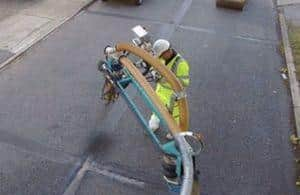New nationwide street works regime to clamp down on pothole pain - how will this improve potholes in Sussex?
and live on Freeview channel 276
People up and down the country will benefit from smoother journeys, reduced congestion, and faster broadband rollout as the Government clamps down on utility companies for leaving potholes behind after carrying out street works.
From April 1, new regulations will come into force for a performance-based inspection regime to ensure utility companies resurface roads to the best possible standard after street works, potentially preventing thousands of potholes from developing in the future.
Advertisement
Hide AdAdvertisement
Hide AdThe move comes as the Government is investing over £5.5 billion by 2025 in highways maintenance and could help motorists save money on expensive repairs by protecting their vehicles from damage to tyres or suspension. It will also ensure cyclists and motorbike riders can drive more safely and with greater peace of mind.


Currently, about 30% of utility companies’ street works are inspected regardless of how well those street works are carried out. Under the new “street works regime” utility companies will be assessed on the quality of their road repairs after carrying out street works, with the best companies inspected less and the worst-performing companies inspected more, based on their performance.
As a result, companies that leave behind roads in poor condition could see 100% of their street works inspected. With highway authorities now charging £50 per defect inspection and a further £120 for follow-up inspections, poor performing companies will now be incentivised to perform better to avoid incurring high financial charges.
While the average failure rate for street works by utility companies is currently 9%, some of the worst performers are failing inspections by as much as 63%.
Advertisement
Hide AdAdvertisement
Hide AdOther reforms in the inspection framework will help telecoms operators roll-out broadband nationwide and ease congestion by mandating better live updates on roadworks to help drivers plan ahead.
Transport Secretary Mark Harper said:“We’re investing more than £5.5 billion over this Parliament to maintain roads up and down the country, and today’s measures are yet another example of how this Government is on the side of motorists and other road users, leaving no stone unturned in the fight against the plague of potholes.
“The new street works regime is a victory for all road users, with motorists and cyclists able to enjoy smoother, safer, and less congested journeys as we continue to level up transport across the country and grow the economy.”
The street works regime comes as the Government is investing more than £5.5 billion between 2020 and 2025 into highways maintenance, including the Potholes Fund announced at Budget 2020, and the extra £200 million announced at Budget 2023.
Advertisement
Hide AdAdvertisement
Hide AdThis funding settlement allows local authorities to plan effectively for managing their roads and is enough to fill millions of potholes, repair dozens of bridges, and resurface roads up and down the country.
RAC head of roads policy Nicholas Lyes said:“Potholes not only cause extensive damage to vehicles but are potentially lethal to those on two wheels. Utility companies have a responsibility to ensure roads are properly repaired after carrying out essential maintenance, but unfortunately far too many roads are left in a substandard condition.
“Introducing new regulations to encourage repairs to be done to a higher standard first time around will benefit all road users.”
See more: PICTURES: Resident complains to the council about Crawley road with SEVEN potholes - council provides update, Potholes in West Sussex: all you need to know about how the County Council is tackling the problem and how you can make a report, As Lloyds and Nat West announce dozens of bank branch closures this is how Sussex will be affected – and when
The measures will also help drivers plan ahead and ease congestion as utility companies and local authorities will now be required to provide the Department for Transport’s street manager service with more up to date and accurate data on live works, including at weekends.